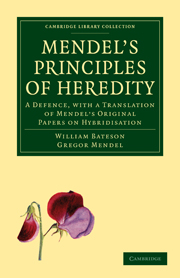 Mendel's Principles of Heredity
Mendel's Principles of Heredity Published online by Cambridge University Press: 07 September 2010
INTRODUCTORY REMARKS
Experience of artificial fertilisation, such as is effected with ornamental plants in order to obtain new variations in colour, has led to the experiments which will here be discussed. The striking regularity with which the same hybrid forms always reappeared whenever fertilisation took place between the same species induced further experiments to be undertaken, the object of which was to follow up the developments of the hybrids in their progeny.
To this object numerous careful observers, such as Kölreuter, Gärtner, Herbert, Lecoq, Wichura and others, have devoted a part of their lives with inexhaustible perseverance. Gärtner especially, in his work “Die Bastarderzeugung im Pflanzenreiche” (The Production of Hybrids in the Vegetable Kingdom), has recorded very valuable observations; and quite recently Wichura published the results of some profound investigations into the hybrids of the Willow. That, so far, no generally applicable law governing the formation and development of hybrids has been successfully formulated can hardly be wondered at by anyone who is acquainted with the extent of the task, and can appreciate the difficulties with which experiments of this class have to contend. A final decision can only be arrived at when we shall have before us the results of detailed experiments made on plants belonging to the most diverse orders.
To save this book to your Kindle, first ensure no-reply@cambridge.org is added to your Approved Personal Document E-mail List under your Personal Document Settings on the Manage Your Content and Devices page of your Amazon account. Then enter the ‘name’ part of your Kindle email address below. Find out more about saving to your Kindle.
Note you can select to save to either the @free.kindle.com or @kindle.com variations. ‘@free.kindle.com’ emails are free but can only be saved to your device when it is connected to wi-fi. ‘@kindle.com’ emails can be delivered even when you are not connected to wi-fi, but note that service fees apply.
Find out more about the Kindle Personal Document Service.
To save content items to your account, please confirm that you agree to abide by our usage policies. If this is the first time you use this feature, you will be asked to authorise Cambridge Core to connect with your account. Find out more about saving content to Dropbox.
To save content items to your account, please confirm that you agree to abide by our usage policies. If this is the first time you use this feature, you will be asked to authorise Cambridge Core to connect with your account. Find out more about saving content to Google Drive.